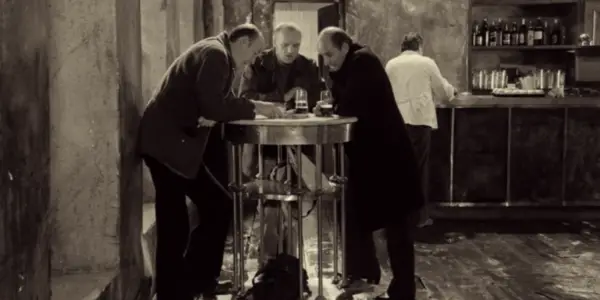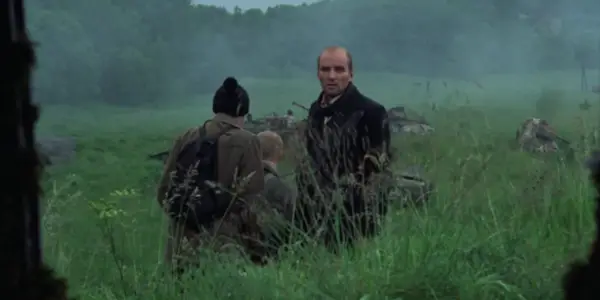Sculptures in Time Pt. V: Tarkovsky’s STALKER

Stephen Borunda is an educator and filmmaker currently located in…
The oeuvre of Russian director Andrei Tarkovsky is anything but a neutral ideological environment for the spectators of his cinema. Whenever we enter the mind of Tarkovsky, via one of his cinema creations, we are instantly embedded within his erudite nebula of ideas – a teeming web charged with inquiries and disquisitions into a variety of metaphysical topics.
Tarkovsky’s 1979 science fiction film Stalker features a story-line that is perhaps the most ambitious metaphysical work of his dramaturgy. This film – about a trio’s explorations into the mystical “Zone” in a post-apocalyptic future – seeks to inquire into the possible directions for the future social evolution of mankind. Tarkovsky lived the majority of his life under the specter of the Cold War, and the influences of the ideas of this epoch are present in this film.
I contend that Stalker delineates the duel between the antagonistic ideologies within Russia that Tarkovsky observed during the Cold War; on one side is what I will term the ethic of force and in opposition is what I will term the ethic of spirituality. These two ideologies provide very different implied methodologies for how mankind should evolve. In this essay, I will explore the origins of these ideas in philosophy, how these ideas are supported by the film’s characters, and what path Tarkovsky seems to desire for humankind to follow.
The Ethic of Force and the Ethic of Spirituality
The ethic of force is characterized by ideas that are aligned with the German philosopher Friedrich Nietzsche and specifically his positions that that power be able to express itself and overcome the corrosive power of organized religion. Alternatively, the ethic of spirituality supports the idea that “love hopes all things” espoused by Søren Kierkegaard. But, in addition to “hope,” the ethic of spirituality even more prominently condones weakness and pliability in order to adhere to universal truth above strength and firmness. Such ideas about the centrality of flexibility to life are found in the ancient Chinese philosophy of the Tao Te Ching.

By prominently featuring ideas found in both modern Western philosophy and ancient Chinese philosophy, Tarkovsky has effectively positioned two paradigms – an Eastern one and a Western one – in opposition to each other. This may remind us of Samuel P. Huntington’s Clash of Civilizations, where the future is bound to be composed of polemic cultures and peoples across the globe. But, Tarkovsky’s film might be best understood as a clash more so between ideas from the East and West for the future of Russia herself.
Russia has always been an amalgamation of Eastern and Western ethnicities; we might consider indigenous Asian cultures residing in Russia today or think further back to the Mongolian Empire’s pillaging of what would become Moscow. Russia is a heterogeneous and pluralistic society with elements of both the East and West. Stalker acknowledges this schism, and Tarkovsky does seem to take a stand at the film’s peroration.
The Great Triumvirate
Stalker draws us in by using an eclectic trio of characters: the odd but holy Stalker (played by Aleksandr Kaydanovskiy) and his two companions, the Writer (Anatoliy Solonitsyn) and the Professor (Nikolay Grinko). The Stalker acts as the guide to these two aptly named men through a desolate area forbidden to public access called the “Zone.” The “Zone” seems to be near sentient, and it supposedly contains a room with wish-granting powers. In the opening moments of the film, the Stalker leads the Writer and the Professor past soldiers to a small railway cart that they use to venture covertly into the “Zone.” The “Zone” itself is of mysterious origins; while there are some mentions of extraterrestrial origins for the “Zone” in the film, all we spectators witness are artifacts of mankind’s self-immolation.
The Writer has decided to take this journey to find inspiration for his writing, while the Professor desires to conduct scientific research on the area. Tarkovsky uses the traditional journey motif as the characters seek to navigate through the “Zone” to find the mysterious room that can grant wishes. Along the journey, the Stalker throws small weights ahead of the group in an effort to seemingly ensure that the road is free of explosives. The Stalker is very adamant that in this place, “Old traps disappear and new ones emerge. Safe spots become impassable. Now your path is easy, now it’s hopelessly involved. That’s the Zone.” Thus, the Stalker regularly redirects the characters onto obscure and indirect paths in order to avoid dangers that may or may not exist.

On these paths, the characters engage in philosophical diatribes about various metaphysical and ontological questions. The Writer and the Professor seem to be at odds for most of the film; the Writer seems to revel in creativity and in truth reached through argument. He accuses the Professor of relying too much upon empiricism. Yet, when the trio finally reach the end of their journey through the “Zone” to the room, it is clear that both the Professor and the Writer express their subservience to what I have termed the ethic of force. They both prefer that the room is destroyed before they ever enter it. The Professor finds a bomb and the Writer then attempts to help him to detonate it. “This place, as we can see, cannot make anybody happy. [What would happen if this power] falls into the wrong hands…” says the Professor.
Strength as the Way
This room within the “Zone” seems to be a metaphor for organized religion or even god itself. Generally, religions (especially, the Abrahamic or Vedic faiths) claim god or gods have the power to know our hearts and bless us if we are worthy. These attributes are those given to the “Zone.” The Writer and the Professor symbolize an intellectual elite of sorts – the strength of mankind. They seek to create a reality, in the manner of Nietzsche’s Zarathustra (the Übermensch), in which, “God [has] died” and the strong are finally able to express their strength without the restraints placed upon them by the weak. These two men literally want to destroy the last remnants of spirituality in this world that has been colored by the filmmaker to look drained of life. The Stalker fearfully proclaims that, in fact, the Scientist wants to “destroy…hope” itself.
But, the Writer also frustrated with the Stalker’s meandering, no longer sees him as a guide but a parasite: “You earn money on our … grief! And it’s not even about the money. You relish here, don’t you, here you are the king and the God, you, hypocritical nit, decide who will live and who dies.” Such lines of dialogue are reminiscent of Nietzsche’s arguments found in On the Genealogy of Morals: “We must count the ascetic priest as the predestined savior, shepherd, and advocate of the sick herd…Dominion over the suffering is his kingdom…” The Writer and the Professor see the spirituality expressed through the room as a place where the corrupt and most misguided of humans find their actions validated. Such “shepherds” prop themselves up by providing others with false hopes. Thus, in the minds of the Writer and the Professor they, as the strong, are justified in their attempts to discard the “Zone” and its flawed devotees.
Faith and Pliability
So while Tarkovsky aligns the Writer and the Professor as adherents to the ethic of force, the Stalker is a disciple of the ethic of spirituality. A popular alternative existentialist philosopher who, in many facets, lies in opposition to the German philosopher Nietzsche, is the Danish Søren Kierkegaard. An obvious ideological edifice exists between these existentialists, since Nietzsche sought to deconstruct the Christian interpretation of God, while Kierkegaard was one of the foundational framers of Christian existentialism. While the Writer and Professor support this ethic of force validated by Nietzschean ideas, the Stalker promulgates ideas that align with Kierkegaard and Eastern philosophy.
In his book entitled Works of Love, Kierkegaard proclaims, “In truth, everyone who does not understand that the whole of life shall be a time of hope is in despair…[and] breaks with the eternal.” The Stalker’s most noteworthy prayer mirrors Kierkegaard’s sentiments about the importance of optimism. Tarkovsky wrote, and the Stalker stated, “let it come true what has been planned. Let them believe. And let their laugh at their passions; for what they call a passion is only a friction between the soul and the outer world.” The fears and apprehensions of his companions are worthy of engagement but, for the Stalker, all concerns are teleological and move towards belief.

However, the Stalker’s ethic of spirituality leaves European soil (in a Russian fashion) and goes east to Asia. In particular, the Stalker’s beliefs very much mirror those expressed by Chinese philosopher Lao Tsu. The Stalker’s deference to the “Zone” and its room despite their illegality parallels Lao Tsu’s recognition of the universal moral code (Tao) and its omnipresence: “[Water] flows in places people reject and so it is like the Tao.” In comparison, the Stalker sees the “Zone” as a special place for those with nothing except a wish to again regain their hope. He states, “I think it lets those pass who… have lost all hope.” The “Zone” is a place for new beginnings in the mind of the Stalker. However, in order to start anew, one must be weak and, thus, flexible.
Strength, for the Stalker and in opposition to the ideas of Nietzsche, is a sign of permanency, age, and decay: “When a man is born, he is weak and supple, when he dies – he is strong and callous. When a tree grows, it is tender and gentle, and when it is dry and hard, it dies. Hardness and strength are companions of death, suppleness and weakness express the freshness of living.” Such notions borrow directly from the Tao Te Ching, where Lao Tsu challenges humans to “[become] supple…[and] be as newborn babe[s].” True autonomy is found in being pliable and flexible for “soft and weak overcome hard and strong.” We can only learn when there is room for growth, not when our very beings have become calcified. Human progress for both Lao Tsu and for the Stalker cannot be found in the destruction of faith and the assertion of human strength, but in our recognition of ourselves as beings that must listen and defer to something beyond ourselves.
Tarkovsky’s Final Stance
The Professor and the Writer, ultimately, do not enter the room to confirm its existence nor to destroy it. The Stalker returns to his town and his family. While he and his wife argue because the Stalker will not take his wife to the “Zone,” their daughter demonstrates her telekinetic powers while Beethoven’s “Ode to Joy” plays in the background. Tarkovsky claimed that his personal ideology was becoming “more and more Eastern” because of his preference for how the “Eastern man is called upon to offer himself as a gift to everything that exists.” This ultimate moment in the film affirms Tarkovsky’s sentiments.
While other characters speak of the Stalker and his family as cursed due to the Stalker’s ventures into the “Zone,” his sacrifice has blessed his daughter with powers that suggest she is the next step in human evolution. She displays the power of telekinesis that allows for her to move a cup off of a table. The close-up on the daughter and the power of this “affection-image” (as Deleuze termed close-ups) indicate that it is not through Nietzsche’s Übermensch that mankind will evolve but through our belief in hope, in the purpose of our vulnerabilities, and a power beyond ourselves.
What is the “Zone?” Is your interpretation of the story more grounded in science fiction? What do you make of the trio?
Does content like this matter to you?
Become a Member and support film journalism. Unlock access to all of Film Inquiry`s great articles. Join a community of like-minded readers who are passionate about cinema - get access to our private members Network, give back to independent filmmakers, and more.
Stephen Borunda is an educator and filmmaker currently located in Baltimore, Maryland. He completed his undergraduate and graduate education at the Johns Hopkins University. Stephen loves metaphysical films, photography, inspirational poetry, philosophy with political utility, and bashing his head in as a rugby player. Hopefully, his writing doesn't suffer too much as a result of this trauma.













